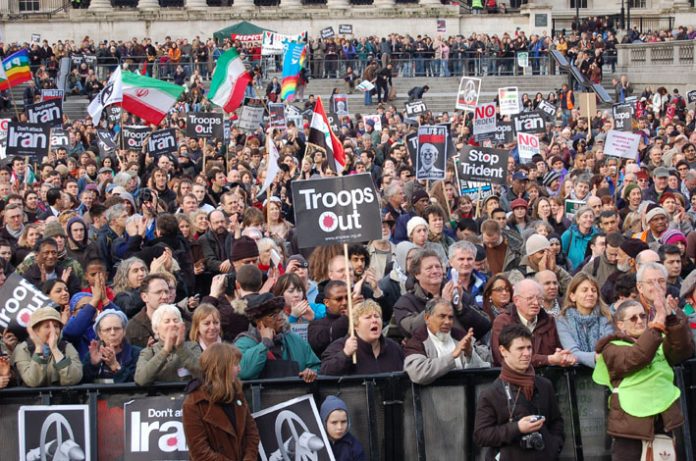BRITISH troops are no longer necessary for the security of Iraq and should go home, Prime Minister Maliki has declared.
In his view the British army and government betrayed his puppet regime when it made a secret deal with the Mahdi army which allowed it to retreat to Basra airport without any opposition from the Mahdi army.
Maliki states that he thanks them for the role they have played, but thinks that their stay is not necessary for maintaining security and control.
In his opinion the british in iraq are no longer a fighting force.
He says: ‘There might be a need for their experience in training and some technological issues, but as a fighting force, I don’t think that is necessary.’
He adds about the retreat to Basra airport.
‘At the time Basra was not under control of the local government, but in the hands of the gangs and militias.
‘British forces stayed away from the confrontation, which gave the gangs and the militias the chance to control the city.’
He said of the situation that it deteriorated so badly that corrupted youths were carrying swords and cutting the throats of women and children.
Then ‘the citizens of Basra called out for our help and we moved to regain the city.’
Maliki remains very much opposed to the British deal with Moqtada al-Sadr and his Mahdi Army, Iraq’s largest Shi’ite militia, to stop mortar and rocket attacks on British forces.
He regarded the deal as ‘The beginning of a disaster,’ he said.
It was carried out without any consultation. ‘The problem in Basra started when they acted alone’.
Maliki maintains that the crisis was only averted when he decided to send thousands of Iraqi forces into the city, which were then supported by the US army.
Maliki maintains that he however holds no grudges against the British. Despite the disagreements, ‘the Iraqi area remains open for British companies and British friendship’.
He added that Iraqi forces were now taking responsibility for security
Meanwhile the Iraqi puppet regime has ordered nearly 1,000 police to patrol Christian areas of the northern city of Mosul to protect them from violence.
Prime Minister Maliki ordered an immediate investigation into the killings of Christians in Mosul and pledged to take all steps necessary to protect the threatened community.
‘We will take immediate action to resolve the problems and difficulties faced by Christians in Mosul,’ Maliki said in a statement released by his office after a crisis meeting with two Christian lawmakers.
Two brigades of national police were deployed in the city, interior ministry spokesman Abdul-Karim Khalaf said.
Despite the reinforcements, at least eight people including a Christian were killed in four separate attacks on Sunday, security officials said.
Two investigation teams, one security and the other criminal, have also been sent to probe a spate of attacks on Christians in Mosul since September 28, in which at least 12 members of the community have now been killed, Khalaf added.
Police were seen setting up checkpoints at churches in the city’s four largely Christian areas and were patrolling the streets on foot.
Nearly 1,000 Christian families have fled their homes in the city since Friday, taking shelter on the northern and eastern fringes of Nineveh province, according to provincial governor Duraid Kashmula.
Kashmula said the violence was the worst against Christians in five years.
‘It is the fiercest campaign against Christians since 2003,’ Kashmula said on Saturday. ‘Among those killed over the past 11 days were a doctor, an engineer and a handicapped person.’
At least three homes of Christians were blown up by unidentified attackers on Saturday, security officials said.
In the latest incidents in the city, at least eight Iraqis were killed and several dozen wounded in four attacks, including a shooting and two suicide car bombs aimed at American and Iraqi soldiers, the US military and police said.
One Christian was killed and his nephew wounded late Sunday when unidentified gunmen opened fire in the eastern neighbourhood of Hay al-Ekhaa, an officer with the local police said.
Earlier a suicide car bomb targeting coalition forces killed five and wounded 10 Iraqis, US army spokesman Staff Sergeant Sam Smith said, adding that no American soldiers were among the casualties.
Among the dead were three young boys, he said.
‘The second car bomb was targeting Iraqi police and wounded 25 Iraqis. We don’t know how many were police or civilians,’ Smith said.
In another incident, two Iraqis died and three were hurt as a homemade device exploded outside a prison, a Mosul policeman said.
Since the US-led invasion of 2003 more than 200 Christians had been killed and a string of churches attacked, with the violence intensifying in recent weeks, particularly in the north.
Iraq’s Christian community includes various denominations, including Syrian Orthodox and Catholic, Armenian Orthodox and Roman Catholic congregations.
The Christian community and many other Iraqis look back to the days of Saddam Hussein as a golden era when sectarianism was not tolerated and sectarian attacks and murders were non-existent.
l Lebanese Christian political leader General Michel Aoun is currently visiting Tehran.
He said on Monday that Iran was helping Lebanon to achieve national unity and dismissed criticism at home about his visit to the Islamic republic.
‘Iran is especially helping Lebanon today in confronting its problems and achieving national unity,’ Aoun told a joint news conference with Iranian Foreign Minister Manouchehr Mottaki.
‘Iran never helped one Lebanese party against the others,’ said the leader of the Free Patriotic Movement who is allied with the Iran- and Syria-backed Shi’ite movement Hezbollah.
He said he was ‘surprised and astonished’ at criticism from Lebanese Christian factions about the visit.
Aoun, who arrived in Tehran on Sunday, is due to hold talks with Mottaki, President Mahmud Ahmadinezhad and parliament speaker Ali Larijani.
Shi’ite-majority Iran is a staunch supporter of Hezbollah although it denies Israeli charges of providing military backing to the militant group.
